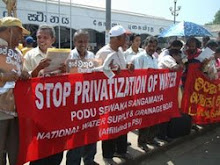Privatization Pros:
- While most countries are committed to increasing access to safe water and thereby reducing child mortality
- Water will reach more people in a more efficient manner
Privatization Cons:
* As a basic human need, water service should be a responsibility of governments. Transfer of control to a private entity that seeks to maximize profits reduces public accountability and can adversely affect the quality and equity of service.
* Water privatization can negatively impact low-income and underserved communities by unfair rate increases and poor service to these communities.
* Water privatization may lead to lower quality service and higher rates. In cases where communities have tried to reclaim their water systems from private entities, poor water quality, unresponsiveness to customer complaints, and rate hikes have been the most frequent complaints.
* Private multinational companies don't have a stake in the community in which they operate. This can have negative effects on small communities when it results in firing city employees and hiring new staff or significantly cutting benefits to long-time employees.
* Many privatization agreements fail to include adequate public participation. In addition, many of these contracts do not include enough provisions for contract monitoring and accountability.
* Many privatization efforts ignore the impact on local ecosystems and downstream water users, and may have long-term negative effects on the environment.
* Private companies, which stand to make more money for the sale of more water, may neglect the potential for water use efficiency and conservation improvements.
Let's look at the victims here: the PEOPLE and the ENVIRONMENT! Both voices are lost in the grand conflict that is raging around the privatization of water.
Now, according to Parlimentary reports much of the aid that grassroots campaigners against the privatization of water has been given by the Parliament. This is hardly surprising when considering that Paraguay has a fairly new democracy (still with a few kinks of course) as its governmental institution. Representatives from all over the country spoke for their people and voted 32 to 7 against the privatization of water in 1994. It was a victory, and assured the Paraguayan people that their political system did speak for them, even in the face of not reaching IMF targets. Privatization by ESSAP was again shelved, but barely, in 2004-an indicator of the battle that Paraguay is losing ground on with every successive year.
Paraguayans have had their fair share of unfair treatments. Recall the era of tyranny of three successive dictators, the reliance on the World Bank and IMF for aid, and of course: being a third world country and dealing with poverty, disease and lack of development. The government, while attempting to be representative is plagued with corruption, and the once self-sufficient agricultural sector is moving toward mass production of products like soybeans and corn, which will not sustain the population. This is just another hurdle that the country must overcome in the pursuit of some sort of stability.
The people in Paraguay have never really had to PAY for such a fundamental thing as water, and if all of a sudden, they are made to spend a portion of what little they have on water-it takes away from things like education and the exact types of opportunities that would pull Paraguay towards modernization.
Look at this conflict: It's not quite a true zero-sum conflict, (where whatever is gained by one side is lost by the other) because both the corporations and people get something. It is unjust and unfair in many ways because the people of Asuncion are losing money, but getting safe water-but this money goes directly into the corporations. It's like paying for water and basic sanitation: the rich people have to pay, and they can, while the poor people have to pay and oftentimes can't.
In the interest of "preventing death" by charging for water that will decrease disease and infant mortality, what about the people in Asuncion that can't afford the high prices of water and end up dying of thirst? Where's the social justice in that?
Think about it...
-L

3 comments:
Thank u so much. u helped me so much with my water privatization debate!
Isabelle Lamb or something?
As we allow individuals and private entities to control resources, we bring forward the day we will have little or no access.
http://blogs.bootsnall.com/wayne/privatization-of-water.html
Post a Comment